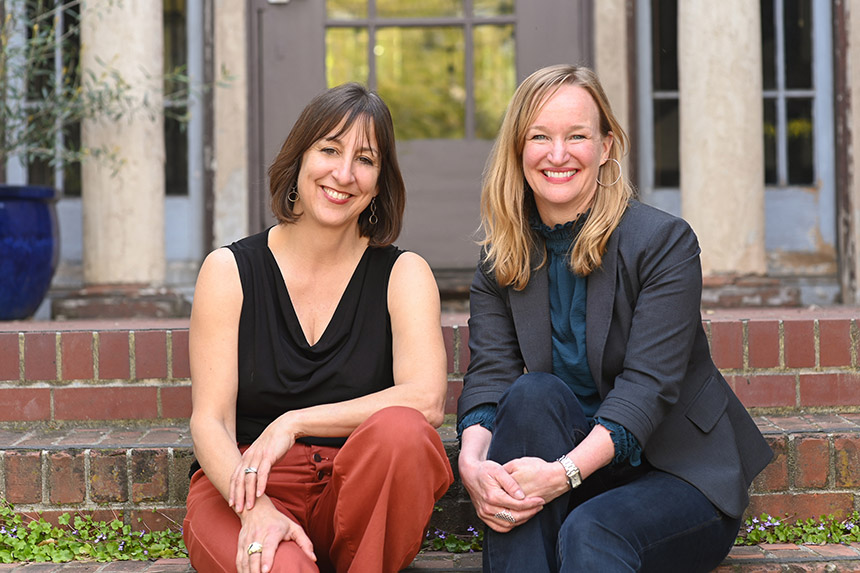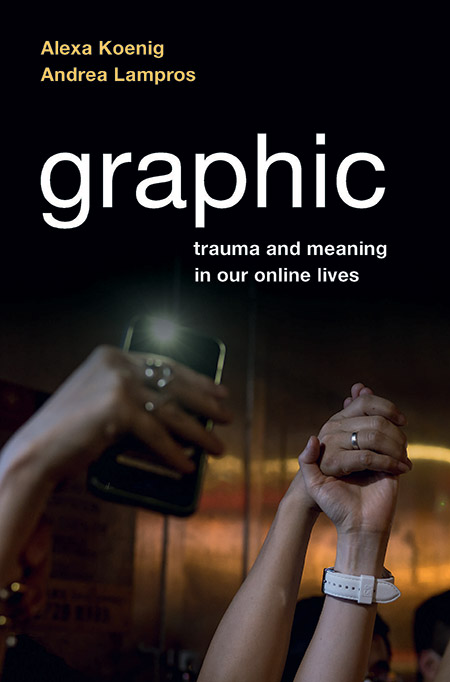
By Gwyneth K. Shaw
Images and videos of atrocious things come at us from an endless array of sources, and seem unavoidable: You turn off the TV coverage of the latest mass shooting only to confront the same event on social media. Close that app and you may open your email to find a friend or family member has shared new footage or photos.
From the agonizing murder of George Floyd to the horrifying attacks in Israel and Gaza, all of us bear witness every day — often through these troubling, even traumatizing, visuals. And that’s nothing new: Photographs and film have been used as testaments since these technologies were invented.
But the rise of the smartphone, and its capability to produce imagery as well as share and view it, has turned a spigot into a firehose. And while these photos and videos can be valuable evidence in the public sphere and in court, they can also take a toll on our mental health.
 In their new book, Graphic: Trauma and Meaning in our Online Lives, Alexa Koenig Ph.D. ’13 and Andrea Lampros draw lessons for everyone from the experiences of experts who work with disturbing materials every day. Koenig, co-faculty director of the UC Berkeley Human Rights Center, and Lampros, a former associate director of the center, founded its Investigations Lab in 2016.
In their new book, Graphic: Trauma and Meaning in our Online Lives, Alexa Koenig Ph.D. ’13 and Andrea Lampros draw lessons for everyone from the experiences of experts who work with disturbing materials every day. Koenig, co-faculty director of the UC Berkeley Human Rights Center, and Lampros, a former associate director of the center, founded its Investigations Lab in 2016.
The first university-based open source investigations lab to discover and verify human rights violations and potential war crimes from social media and other online space continues to spread its work and influence. Students from more than two dozen majors and schools, including Berkeley Law and the UC Berkeley Graduate School of Journalism, work with the lab each semester.
Graphic stemmed directly from that work, says Lampros, a former journalist who’s now the communications director at the journalism school, where she earned a master’s degree.
“We founded the Investigations Lab in order to help make sense of that explosion of imagery from war zones that everybody could look at — to document it and to verify it so that it can be used more fully by investigators, by journalists, and others,” she says. “And we wanted to give students the opportunity to participate in that work as investigators and researchers.”
At the time, students were primarily working with videos and photos from the violent conflict in Syria, and Lampros and Koenig were quickly asked by the lab’s partners at Amnesty International about their plan to care for the students’ well-being.
“These were students who were sometimes 18, 19 years old, looking at very graphic imagery from around the world in order to use this in a human rights context,” Lampros says. “So from the very beginning of the lab, we knew that we needed to think about science-based ways to help keep students safe.”
In the era of social media and user-generated content, Lampros and Koenig argue in Graphic, we can all benefit from some of the same strategies the lab uses to protect our mental health. They draw on extensive interviews with human rights advocates as well as researchers examining the toll on all of us to offer evidence-based advice.
Managing trauma
The smartphone has had a democratizing effect, Koenig says. But the posts we see online are often designed not to help tell a story but to grab our attention. Instead of learning about something through the lens of a journalist, for example, the person directly impacted is sharing a raw version of their experience — which can dramatically impact our emotional response.
Want to know more about Graphic and the Human Rights Center’s work in this area? Hear from Alexa Koenig and Andrea Lampros in the premiere episode of our new podcast, “Berkeley Law Voices Carry.”
“Qualitatively it becomes very different than someone coming in who may be very empathic about what they’re witnessing, but has a degree of emotional space still to be able to bring that more objective vision,” she says. “Quantitatively, there’s a huge difference: Where we used to see a handful of photos over and over from the same event, now we may have thousands, if not hundreds of thousands of videos from something that just happened in Syria or on the ground in Myanmar.
“The volume is just so outside of what human beings are used to processing that there’s a real need to figure out how we can better metabolize this onslaught.”
There’s also the issue of control, Koenig adds. When newspapers arrived once or twice a day and TV news was wrapped up in a 30-minute nightly slot, you could mentally prepare for what you’d see, and it would be contained to a particular time and place. Now, Lampros and Koenig note in the book, you can pick up your phone while cooking breakfast for your kids and come across a news alert about the murder of a baby.
Graphic doesn’t encourage readers to look away from difficult imagery, Lampros says, but instead prescribes thinking about how, when, and why we consume them.
“It is very, very important for us to engage with the world,” she says. “But how do we take some control ourselves, and be more intentional about how we are connecting with it so that we can continue to engage with it in a constructive way — so we can make change?”
From collective processing to collective action
She points to Floyd’s murder as a prime example: The video was an instance of racial violence that the nation, and in some ways the world, experienced together. And there was a collective response, in the forms of protests and calls for reforms and legal action against the officers involved.
That group response mimicked earlier tragedies, Koenig says, such as the assassination of President John F. Kennedy and the 1986 explosion of the Space Shuttle Challenger, rather than the more fragmented experience that’s more typical in the smartphone era. Part of protecting ourselves against long-term damage from exposure to disturbing imagery is rebuilding that collective community processing, she says.
Lampros and Koenig asked everyone they interviewed for Graphic whether they’d watched the video of Floyd’s murder. They found many decided to read about it rather than watch for a variety of reasons, from wanting to avoid the extreme pain of viewing another Black man’s death at the hands of police to feeling that it was just inappropriate to watch at all.
“I think we need to make sure we can get access to the news and the facts of what’s taken place,” Koenig says. “But I think there’s so many smart choices people are beginning to make about ‘how and when do I engage with the toughest material?’ There’s a lot to think about in terms of the role of journalists, for even very young people get access to that news.”
When people identify with the graphic violence they see — particularly if they share religious, national, geographic, or other affiliations with what they’re watching — they can be particularly at risk of negative effects and may want to pay extra attention to how they are being affected, then take action to thoughtfully limit their exposure. Turning down the sound when watching videos, Koenig says, is one potential strategy, as is setting strict limits on the time you’re spending looking at this type of material.
Ultimately, Lampros says, protecting yourself starts with being intentional — thinking not just about what you’re viewing but how it’s affecting you. Are you less joyful, drinking more, moving your body less? Is your mood impacted by your scrolling habits? These are some of the things parents can consider about their children, too, she adds.
“We know social media companies are driven by profit and the idea is that you’re going to click on things. Some of the most painful and salacious material is going to be put out there in hopes that you will,” she says. “And until we find ways to mitigate that on a structural level, it’s up to us as individuals and as parents to think about how we are being intentional for ourselves and for our families.
“It’s important that we’re engaging respectfully with this content, and not just mindlessly scrolling.”